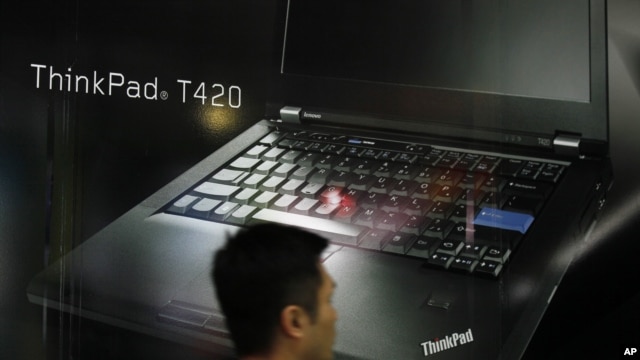
A man walks near an advertisement of Lenovo computer at a shopping center in Hong Kong, Feb. 9, 2012.
BEIJING — For the first time, global technology research group Gartner has crowned China’s Lenovo Group as the world’s biggest maker of personal computers.
The figures released late Wednesday in the United States, show Lenovo with a slight lead (15.7 percent of global PC market) for the third quarter, overtaking its Silicon Valley rival Hewlett Packard which had 15.5 percent of the global share.
Lenovo sold nearly 13.77 million units during that period.
HP slump
Lenovo’s lead over HP may have been small, but according to Gartner's figures the company’s sales were up 10 percent in the third quarter over 2011, while Hewlett Packard's figures slumped more than 16 percent.
In a statement Thursday, Lenovo’s Chief Executive Yuanqing Yang welcomed the news, noting that the company's sales and distribution continue to grow as well as its manufacturing footprint.
But Lenovo’s statement stopped short of claiming victory and acknowledged that, as many analysts and Hewlett Packard also pointed out, market research company International Data Corporation still puts HP in the lead.
Josh Ong, China editor of The Next Web, which monitors technology worldwide, says while the results of both surveys are extremely narrow, one message is clear.
"HP is on its way down and Lenovo is on its way up. If it is not this quarter, it is soon," Ong said.
The IBM purchase
Lenovo leaped into the global personal computer market in 2005, when it purchased IBM’s personal computer business. According to Gartner, HP has been the world’s top maker of PC’s since 2006.
But one thing Lenovo has yet to do, Ong says, is gain a strong foothold in the U.S. market.
"A lot of their growth is happening in Asia," he said. "They are very strong in China of course, they are also doing well in Japan, but they are going to need to really formulate a strategy for spurring adoption in the United States."
To do that, the company still needs to develop both awareness and loyalty in the U.S. market, he says. Something that is not easy to come by.
Breaking into US market
“A lot of Chinese companies have difficulty breaking into the U.S.," Ong noted. "And of course right now with Huawei and ZTE we have got the more extreme example of a company that’s being prevented from competing in the U.S. market and then a company like Lenovo that is an example of someone who has the freedom to compete, but hasn’t yet quite figured out how to market themselves."
Analysts add that while both surveys may not agree who is definitively on the top, it is clear the global market for personal computers is shrinking. And that is because the market is shifting, analysts note, as consumers spend more money on smartphones and tablets, instead of desktops and laptops. |
|
